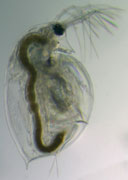The flagship paper describing Daphnia’s genome sequence is authored by 20 IU scientists including professors, postdoctoral fellows and graduate students from the schools of Arts and Science, Public and Environmental Affairs, Informatics and Computing, and was supported in part by the METACyt Initiative of Indiana University, funded in part through a major grant from the Lilly Endowment, Inc. Principal investigators and lab personnel from the biology labs of Mike Lynch, Matt Hahn and Justen Andrews also contributed.
Another large genomics project to which the CGB has substantially contributed is the sequencing and analysis of Theobroma cacao, the tree that produces cocoa beans that are processed into chocolate. In September of last year, candy company Mars Inc., the project’s sponsor, and CGB project leader, Keithanne Mockaitis, announced that the cacao genome had been sequenced. This is the largest genome the CGB has sequenced thus far, with an estimate of roughly 400 million base pairs and 35,000 genes.
The importance of this project is great as farmers and breeders in Asia, South America and West Africa use such genetic findings to improve their planting stocks. With the September announcement, data were released to the public as the Cacao Genome Database. Keithanne Mockaitis, sequencing director of the CGB stated, “When you need to wait three or more years for a tree you plant to bear the beans you sell, you want as much information as possible about the seedlings you’re planting. Making the genome data public further enables breeders, farmers and researchers around the world to use a common set of tools, and to share information that will help them fight the spread of disease in their crops.” The findings could also help reduce poverty in these countries as having more reliable genome data can lead to more sustainable crops.
The Cacao Genome project is a consortium of academic, government and industry partners led by Mars Inc. and the U.S. Department of Agriculture, and including Indiana University, Clemson University, Washington State University, the National Center for Genome Resources, nonprofit organization Public Intellectual Property Resources for Agriculture (PIPRA), the HudsonAlpha Institute, and IBM.
Other IU contributors to the project include CGB research associates James Ford and Zach Smith, data analyst Ram Podicheti, and Don Gilbert, bioinformaticist in the Department of Biology.



 The College of Arts
The College of Arts